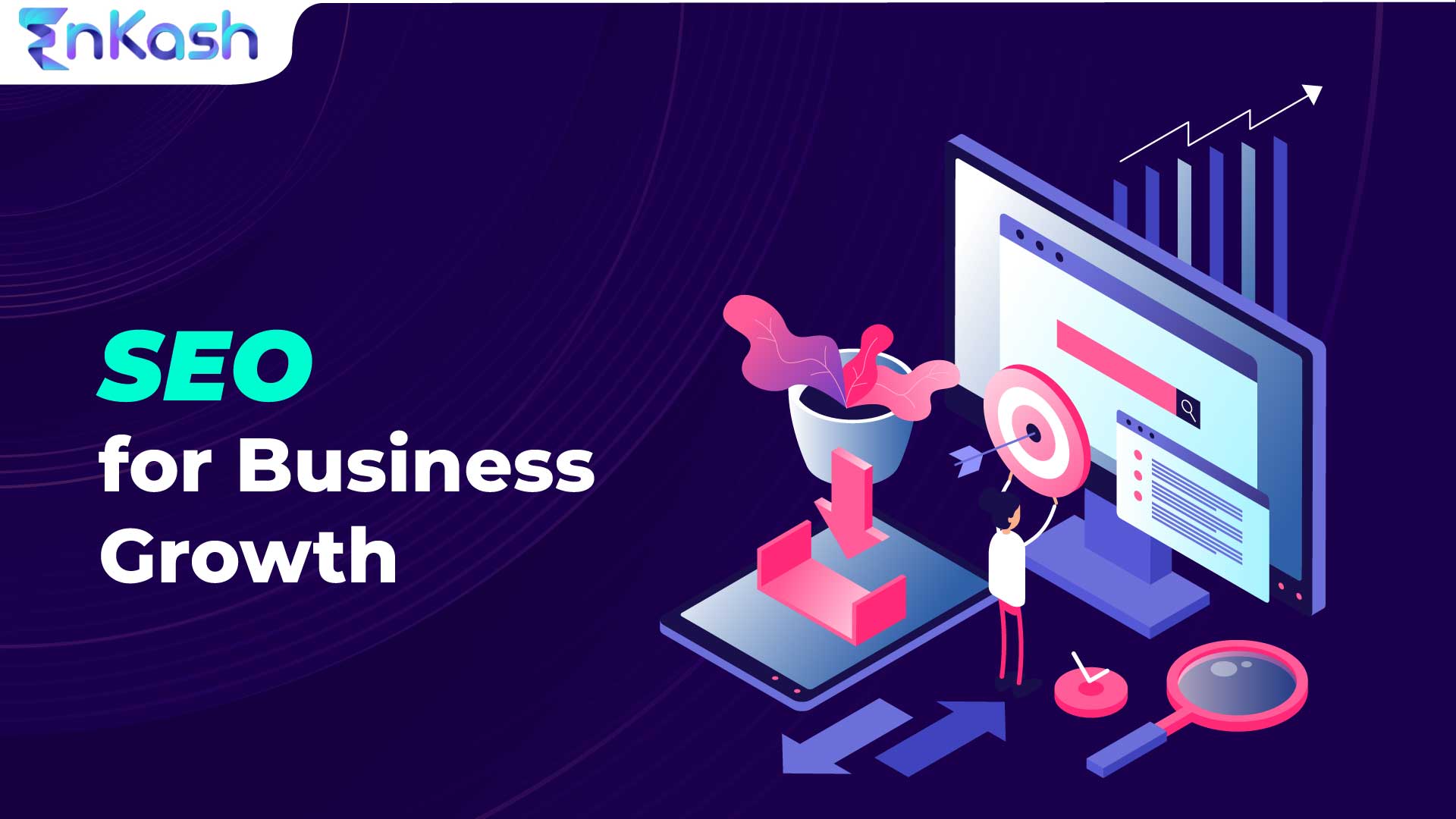In today’s digital landscape, search engine optimization (SEO) plays a vital role in driving business growth. With millions of online searches happening every day, businesses have the opportunity to leverage the power of search engines to reach their target audience and increase visibility. SEO optimization involves implementing strategies and techniques to improve a website’s organic search rankings and attract quality traffic.
By optimizing on-page elements such as keywords, meta tags, and content structure, businesses can enhance their website’s relevance and authority in the eyes of search engines. This, in turn, leads to higher rankings, increased organic traffic, and improved conversion rates. Additionally, search engine marketing (SEM) complements SEO efforts by utilizing paid advertising to further boost online visibility. In this blog, we will explore the fundamentals of SEO for business growth and how organizations can harness the potential of search engines to expand their reach and achieve their marketing objectives.
What is SEO and why it’s important for business growth?
Optimizing a website or online piece of content for search engines is known as search engine optimization or SEO. By strategically incorporating relevant keywords, enhancing on-page SEO elements, and utilizing effective SEO optimization techniques, businesses can increase their online presence and attract organic traffic from search engines.
SEO plays a vital role in business growth by driving targeted traffic, increasing brand visibility, and ultimately boosting conversion rates. It helps businesses gain a competitive edge in the digital landscape by ensuring that their products or services are easily discoverable by potential customers. Moreover, SEO optimization is closely related to search engine marketing (SEM), as it forms the foundation for effective SEM campaigns. By understanding the importance of on-page SEO techniques, such as keyword research and optimization, content relevance, and meta-tag optimization, businesses can harness the power of search engines to fuel their growth and achieve long-term success.
Overview of the Power of Search Engines in Driving Traffic and Customers
Search engines play a pivotal role in driving traffic and customers to businesses. With millions of users conducting searches every day, search engines serve as the gateway to the vast online world. By understanding the power of search engines and harnessing it through effective search engine optimization (SEO) strategies, businesses can increase their visibility, reach their target audience, and drive more organic traffic to their websites.
SEO optimization, which includes on-page SEO techniques, helps businesses optimize their web pages to rank higher in search engine results pages (SERPs), leading to increased visibility and greater chances of attracting potential customers. Additionally, search engine marketing (SEM) techniques, such as paid search advertising, can complement SEO efforts by further boosting visibility and driving targeted traffic to businesses. Leveraging the power of search engines is essential for businesses looking to expand their online presence, increase brand awareness, and ultimately achieve business growth.
Benefits of SEO for Business Growth
SEO, or search engine optimization, plays a crucial role in driving business growth.
- Improved Online Visibility: SEO helps businesses gain higher visibility in search engine results pages (SERPs). By optimizing their website with relevant keywords and content, businesses can appear prominently when users search for products or services related to their industry. This increased visibility leads to more organic traffic and greater exposure to potential customers.
- Increased Website Traffic: SEO optimization techniques attract targeted traffic to a business website. By optimizing on-page elements such as meta tags, headings, and content, businesses can improve their website’s ranking in search results. The higher a website ranks, the more likely users are to click on it, resulting in increased organic traffic.
- Enhanced User Experience: SEO involves improving various aspects of a website, such as its loading speed, mobile responsiveness, and overall user experience. These optimizations not only please search engines but also provide a better experience for visitors. A well-structured and user-friendly website leads to longer visit durations, lower bounce rates, and increased chances of conversions.
- Cost-Effective Marketing Strategy: Compared to other digital marketing strategies, SEO provides long-term benefits at a relatively lower cost. While the initial investment may be required for implementing SEO tactics, the ongoing maintenance and optimization are cost-effective. As organic search results do not involve direct payment for clicks, businesses can enjoy continuous traffic without incurring additional advertising costs.
- Increased Brand Credibility and Trust: A higher search engine ranking instills confidence and trust in users. When a business website appears at the top of search results, it is perceived as more credible and authoritative. Users tend to trust the information and offerings provided by top-ranked websites, which can positively impact brand perception and customer loyalty.
Understanding Search Engine Optimization (SEO)
Understanding Search Engine Optimization (SEO) is crucial for businesses aiming to improve their online visibility and attract targeted traffic. SEO optimization involves techniques such as keyword research, on-page optimization, and search engine marketing to enhance a website’s ranking in search results. By mastering SEO, businesses can drive organic traffic and achieve long-term success.
On-page SEO Techniques
On-page SEO techniques are essential for optimizing a website and improving its visibility on search engines.
Keyword Research and Optimization:
- Conduct thorough keyword research to identify relevant and high-performing keywords for your target audience.
- Optimize your web pages by strategically incorporating these keywords in the page titles, headings, URLs, and body content.
- Use variations and long-tail keywords to capture specific search queries and attract more qualified traffic.
Content Optimization and Relevance:
- Create high-quality and relevant content that aligns with the interests and needs of your target audience.
- Optimize your content by incorporating the identified keywords naturally and organically throughout the text.
- Ensure that your content provides valuable information, answers user queries, and offers a seamless reading experience.
Meta Tags and Descriptions:
- Optimize your meta tags, including the title tag and meta description, with relevant keywords to improve visibility in search engine results.
- Craft compelling and descriptive meta tags that accurately summarize the content of your web pages and entice users to click through.
- Use unique meta tags for each page, focusing on relevance and providing a clear preview of the page’s content.
Implementing these on-page SEO techniques will enhance your search engine optimization (SEO) efforts, boost your website’s visibility, and attract more targeted traffic to your business.
Off-page SEO Techniques
Off-page SEO techniques play a crucial role in improving a website’s authority, reputation, and visibility in search engine rankings.
Link Building and Backlinking Strategies:
- Implement effective link-building strategies to acquire high-quality backlinks from reputable and relevant websites.
- Seek opportunities for guest blogging, partnerships, and collaborations to earn valuable backlinks.
- Focus on acquiring natural and authoritative backlinks that demonstrate your website’s credibility and expertise.
Social Media Integration and Engagement:
- Integrate your website with social media platforms to enhance your online presence and engage with your target audience.
- Share valuable content, interact with users, and encourage social sharing to increase brand visibility and generate traffic.
- Utilize social media platforms to build brand loyalty, foster customer relationships, and drive engagement.
Online Reputation Management:
- Monitor and manage your online reputation to maintain a positive image and credibility.
- Encourage satisfied customers to leave reviews and testimonials to build trust and credibility.
- Address and resolve any negative feedback or customer concerns promptly and professionally.
By implementing these off-page SEO techniques, you can enhance your search engine optimization (SEO) efforts, improve your website’s authority and reputation, and ultimately drive more organic traffic and business success.
Integrating Search Engine Marketing (SEM) with SEO
Integrating Search Engine Marketing (SEM) with Search Engine Optimization (SEO) can be a powerful approach to maximize your online visibility and drive business growth. Here’s a breakdown of key points:
Overview of SEM and its Relationship with SEO:
- SEM involves paid advertising to increase the website visibility on search engine result pages (SERPs).
- SEO focuses on optimizing organic search results through various on-page and off-page techniques.
- SEM and SEO work together to enhance your online presence, increase website traffic, and improve search engine rankings.
Benefits of Combining SEO and SEM for Business Growth:
- By combining SEO and SEM, you can target both organic and paid search results, maximizing your reach and exposure.
- SEO helps build a strong foundation for long-term organic traffic, while SEM provides immediate visibility and results.
- Together, SEO and SEM increase brand awareness, drive targeted traffic, and boost conversions and revenue.
Strategies for Effective SEM Campaigns:
- Conduct thorough keyword research to identify high-performing keywords for your SEM campaigns.
- Create a compelling ad copy that aligns with your target audience’s needs and encourages click-throughs.
- Optimize landing pages to ensure a seamless user experience and maximize conversions.
- Continuously monitor and analyze your SEM campaigns to refine your strategies and achieve optimal results.
By integrating SEO and SEM, you can leverage the strengths of both approaches to maximize your online visibility, drive targeted traffic, and ultimately fuel business growth.
Conclusion
Harnessing the power of search engines through effective search engine optimization (SEO) and search engine marketing (SEM) strategies is crucial for achieving business success in today’s digital landscape. By optimizing your website, content, and online presence, you can improve your visibility, drive targeted traffic, and increase conversions.
Also Read: On-Page Optimization: A Guide for Business Owners
Embracing on-page and off-page SEO techniques, integrating SEM with SEO, and staying updated with the evolving search engine algorithms are key steps towards staying competitive and reaching your business goals. Remember that search engines are powerful tools that can connect you with potential customers and drive growth, so investing time and resources in optimizing your online presence is a worthwhile endeavor.
By leveraging the power of search engines, you can enhance your brand’s visibility, establish credibility, and unlock new opportunities for business success in the digital realm.













